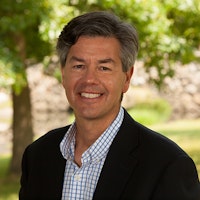Transitioning to a sustainable and just economic system is the ultimate challenge of the 21st century… Before racing into action… let us begin by recognizing and professing the truth.
Transitioning to a sustainable and just economic system is the ultimate challenge of the 21st century… Before racing into action… let us begin by recognizing and professing the truth.
John B. Fullerton

The Ultimate Challenge
Topic: Society & Civil Religion
At the end of The Kingdom of God is Within You, Leo Tolstoy underscores the importance of grounding our lives, and by extension, our society and institutions, including our economic system, which profoundly impacts all life on earth, on the bedrock foundation of truth.
“The sole meaning of life is to serve humanity by contributing to the establishment of the kingdom of God, which can only be done by the recognition and profession of the truth by every man.”—Leo Tolstoy
Transitioning to a sustainable and just economic system is the ultimate challenge of the 21st century. History no doubt will judge our generation by how well we acknowledge, embrace and take up this challenge. Before racing into action, into our Cartesian predisposition toward logical problem solving, let us begin by recognizing and professing the truth.
John B. Fullerton was born on May 20, 1964, in Syracuse, New York, and spent his formative years in this vibrant city. He demonstrated an early interest in economics and finance, which led him to pursue undergraduate studies at the University of Michigan College of Literature, Science, and the Arts. Following his graduation, Fullerton furthered his education at the NYU Stern School of Business, where he obtained an MBA. His academic background provided a strong foundation for his subsequent roles in the financial sector, including a significant tenure as a managing director at J.P. Morgan. John Fullerton is married to Claire Fullerton, and they have two children. The family has been an integral part of his journey, both personally and professionally.
John Fullerton has been a proponent of shifting economic paradigms towards more sustainable and equitable systems throughout his career. His thought leadership is heavily influenced by the Wisdom Traditions and a regenerative understanding of the principles of Nature, advocating for economic practices rooted in truth and sustainable value. Fullerton critiques current economic models that emphasize short-term growth and efficiency, suggesting instead an "economics of permanence" that prioritizes long-term stability and durability. His ideas challenge conventional practices and encourage a reassessment of economic goals to align more closely with the principles of sustainability and justice.
In his writings and speeches, John Fullerton calls for integrating traditional wisdom into contemporary economic practices to achieve a more balanced approach to human and ecological well-being. This vision for economic reform is not just about revising old concepts for modern applications but fundamentally rethinking economic objectives to focus on truth and long-term sustainability. Through his work, Fullerton not only questions existing frameworks but also inspires discussions on how to reshape economic strategies to support a just and sustainable future for all. His efforts highlight the importance of basing our economic systems on values that promote enduring well-being and fairness.
The Relevance of E. F. Schumacher in the 21st Century
Fullerton, John. The Relevance of E. F. Schumacher in the 21st Century, The Center for New Economics.

John B. Fullerton
Theme: Regenerative Economics

About This John Fullerton Quotation [Commentary]
John Fullerton’s emphasis on transitioning to a “sustainable and just economic system” as the paramount challenge of our times carries a profound insight about the essence of modern economic systems and their foundational principles. Fullerton draws inspiration from historical wisdom, notably Leo Tolstoy and E. F. Schumacher, underscoring the necessity for our economic endeavors to be rooted in truth and permanence, rather than ephemeral gains. This aligns with Tolstoy’s spiritual view that the purpose of life—and by extension, our economic activities—should fundamentally serve humanity through the propagation of truth. In stressing the need to pause and “recognize and profess the truth” before taking action, Fullerton advocates for a contemplative approach to economic reform, ensuring that our efforts are not merely reactive but deeply considered and aligned with enduring values.
The current economic paradigms, largely driven by the pursuit of perpetual growth within finite planetary boundaries, are critiqued by Fullerton as unsustainable. Drawing from Schumacher, he suggests that a shift towards an “economics of permanence” is essential. This concept of permanence challenges the prevailing market norms of prioritizing efficiency and speed, advocating instead for values such as durability and stability. These principles are not just philosophical but practical necessities in creating a sustainable future. Schumacher’s economic thought, deeply entwined with virtue ethics, particularly the virtue of prudence—which is fundamentally about truth and realism—guides this perspective. Thus, Fullerton’s reflection extends beyond economics into a broader philosophical and ethical discourse about how societies should govern their resources and technological advancements.
Ultimately, Fullerton’s commentary calls for a paradigm shift from conventional economic thinking to one that is rooted in wisdom and long-term sustainability. He urges us to incorporate timeless wisdom from diverse cultural and philosophical backgrounds into contemporary economic practices. This integration is not just about adapting old ideas into new contexts but about rethinking the goals of economic activity to reflect deeper truths about human well-being and ecological balance. By emphasizing the need for a truthful foundation in our economic systems, Fullerton not only challenges the status quo but also invites us to envision a transformative path that reconciles economic practices with the imperative of sustainability and justice for all.
John Fullerton, The Relevance of E. F. Schumacher in the 21st Century
An Inherently Unsustainable System
“New and appropriate technologies and massive shifts to improve resource efficiency and reduce waste no doubt will help and buy time. But we cannot underestimate the profound inconsistency of a resource intensive material economy built on perpetual growth, operating within the physical limits of a finite planet. Such an inherently unsustainable system is not built upon wisdom. It is built upon a foundation of sand that intentionally rejects the very principles of traditional virtue, as Keynes explicitly pointed out.
Unlike during Keynes’ time, when the human population was small and relatively poor (therefore placing few resource demands on the environment) and the earth’s resources appeared limitless, it is now time that we transcend to an economics built upon wisdom. Schumacher’s instruction is clear and compelling. “From an economic view point, the central concept of wisdom is permanence. We must study the economics of permanence.” This intention takes us in a profoundly different direction than conventional, Cartesian thinking. “Permanence” suggests valuing durability over efficiency, stability over speed. These are different values from those typically celebrated in the marketplace…
We do observe excitement around new “green” initiatives, usually technology based solutions to the problems we perceive. Technology breakthroughs are essential and inevitable, surprising even the optimists among us. Advances in technology and the great human entrepreneurial spirit are essential in tackling the sustainability challenges we face. However, while we run down this path, which we certainly must, we should also heed Einstein’s admonition, “We can’t solve problems by using the same kind of thinking we used when we created the problems.”
Relying on technology solutions alone to solve our sustainability challenges, which are largely the product of technological advances, is not wise. We must think differently, seeing the complexity of the sustainability challenge in a holistic fashion, in the search for genuine lasting solutions. According to Schumacher, we need solutions consistent with an “economics of permanence,” which he tells us is derived from prudence. My research reveals that prudence is the first among the cardinal virtues and is best understood as “truth.” Thomist scholar Josef Pieper, in The Four Cardinal Virtues, closes his chapter on prudence by saying, “The good is prudent beforehand; but that is prudent which is in keeping with reality.” Schumacher is telling us that economics is prudent only if it is truthful, that is to say, only if it is “in keeping with reality.”
—John Fullerton [The Relevance of E. F. Schumacher in the 21st Century (Schumacher Center Essay, May 2008 Edited by Hildegarde Hannum)].
An Economics of Permanence
Following Schumacher’s lead, we should look to the great wisdom traditions for direction in this truth. Where better to look than to the ideas and teachings from all cultures that have stood the test of time, rather than restrict ourselves to contemporary economic theories that we know are limited and incomplete.
Schumacher is relevant to our critical 21st-century challenges precisely for this reason. His philosophy, his concern about the limits of materialistic scientism, his distinctions between divergent and convergent problems, and his ideas of decentralism, appropriate technology, and human scale to name but a few, are all rooted in the great spiritual and philosophical teachings. Not surprisingly, his ideas, in addition to being humane and just, are aligned with nature and nature’s sustainable way, the only truly sustainable system we know. They are, I believe, rooted in truth as best as Schumacher could discern it, and therefore they represent wisdom, the wisdom of permanence…
Our challenge now is to refine and update this thinking and to chart a practical path of convergence between the reality that exists in our economic system today and the principles we strive to uphold and upon which our long run prosperity undoubtedly depends. We will need to stimulate and utilize “appropriate” technological breakthroughs on this path, but at the same time remain grounded in truth. Clarifying the first principles of this truth, as best as our collective wisdom—both past and present—allows, is our most urgent task. The opening decades of the 21st century may be our best chance to launch the critical transformation of our economic system to an economics of permanence. We need to get it right, as only our collective consciousness will allow…
—John Fullerton [The Relevance of E. F. Schumacher in the 21st Century (Schumacher Center Essay, May 2008 Edited by Hildegarde Hannum)].
Resources
Related Quotes
Copyright © 2017 – 2026 LuminaryQuotes.com About Us